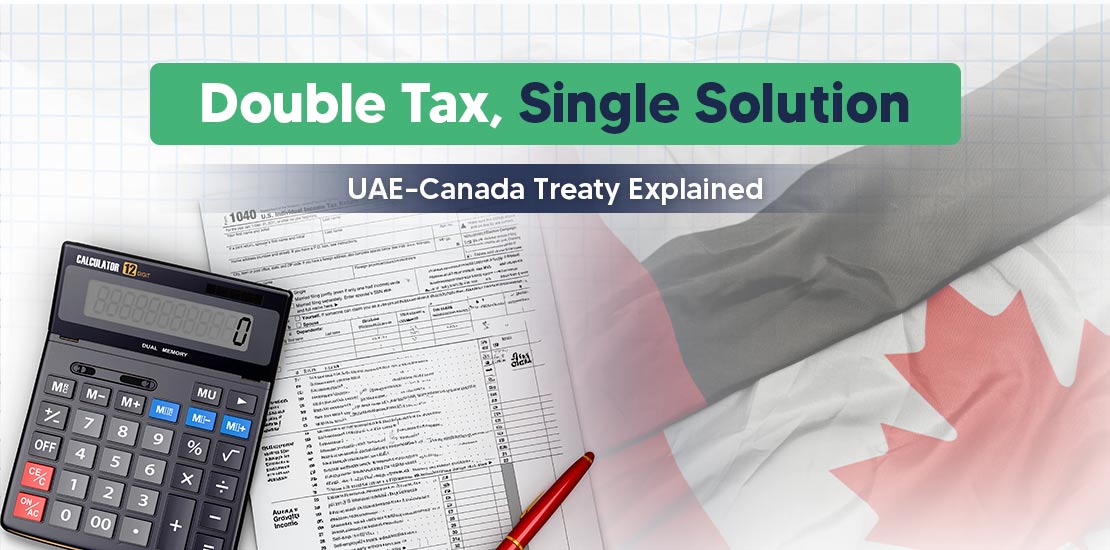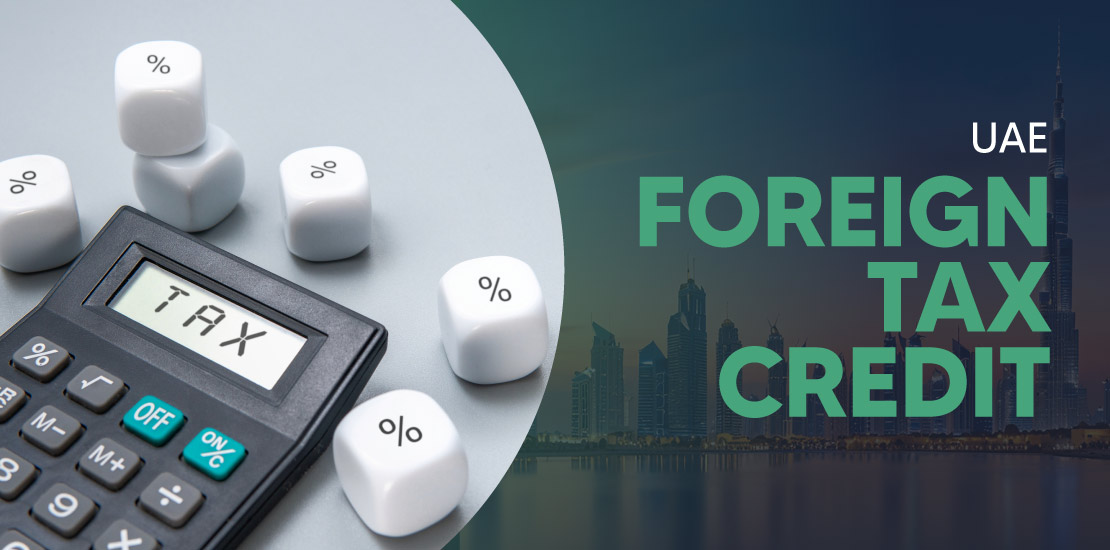Table of Contents
- What is a Double Tax Treaty?
- Key Provisions of the UAE-Canada Double Tax Treaty
- Canada’s Broader Tax Treaty Network
- The Role of the Multilateral Instrument (MLI)
- How Canadian Courts Interpret Tax Treaties?
- Benefits of the UAE-Canada Double Tax Treaty
- Practical Steps for UAE Residents & Businesses
- Staying Compliant and Informed with Shuraa Tax!
For anyone living, working, or doing business between the UAE and Canada, understanding how taxes apply can be tricky. That’s where the UAE Canada Tax Treaty comes in. Signed in 2002 and effective from 2003, this treaty was designed to facilitate the lives of individuals and businesses operating across both countries.
The main goal of the treaty is to prevent double taxation, so you don’t end up paying tax on the same income in both countries. It also encourages cross-border investments by providing clear rules on tax responsibilities, making it more straightforward to plan your finances or business moves. The treaty creates clarity, reduces financial headaches, and supports smoother trade and investment between the UAE and Canada.
What is a Double Tax Treaty?
A double tax treaty is an agreement between two countries designed to prevent the same income from being taxed twice in both countries. Without such contracts, a person or business earning money across borders could end up paying tax in both their home country and the country where the income is generated, a situation known as double taxation.
For example, the tax treaty between Canada and the UAE ensures that individuals and companies operating between these two countries don’t face double taxation on the same income. The treaty clearly defines which country has the right to tax various types of income, including business profits, salaries, and dividends.
Moreover, these treaties limit the host country’s ability to tax certain income and provide mechanisms to resolve disputes if both countries claim taxing rights over the same income. This facilitates smoother cross-border trade and investment, providing taxpayers with clarity on their obligations.
In short, double tax treaties, such as the one between Canada and the UAE, protect businesses and individuals from paying tax twice, encourage international trade and investment, and provide a structured mechanism for resolving tax disputes.
Key Provisions of the UAE-Canada Double Tax Treaty
When it comes to cross-border income, clarity is everything. The UAE-Canada Double Tax Treaty was designed to simplify the tax treatment of individuals and businesses earning income in both countries.
By clearly defining which types of income are taxed, how residency is determined, and what protections exist against unfair taxation, the treaty ensures that taxpayers don’t face unnecessary financial burdens. Let’s break down the most important provisions that make this treaty work:
1. Income Types Covered
The treaty explicitly addresses various types of income to prevent double taxation. This includes pensions, business profits from shipping, income of artists and athletes, students’ income, and income of tax-exempt organisations.
2. Dual Residency Rules
Sometimes, a person or company could be considered a resident in both countries. The treaty provides tie-breaker rules to determine which country has primary taxing rights in such cases.
3. Non-Discrimination and Foreign Tax Credits
The treaty ensures that residents of one country are not unfairly taxed in the other and allows taxpayers to claim credits for taxes already paid in one country against tax liabilities in the other.
4. Mutual Agreement Procedure (MAP)
If double taxation or disputes arise, the treaty provides a formal mechanism for resolving them. This enables the tax authorities of Canada and the UAE to communicate and resolve issues in a structured manner.
Canada’s Broader Tax Treaty Network
Canada has established a strong network of over 90 tax treaties and approximately 25 Tax Information Exchange Agreements (TIEAs) with countries worldwide, including the UAE. These agreements serve multiple purposes: they promote transparency, prevent double taxation, and provide a framework for Canada to engage with countries that have low or no tax rates.
The goal is straightforward: to facilitate international business and investment while ensuring that taxpayers aren’t unfairly taxed twice. In this context, the UAE-Canada Double Tax Treaty is a key part of this network. It reflects Canada’s broader approach to creating clear rules for cross-border income, protecting residents and businesses, and providing mechanisms to resolve disputes efficiently.
By being part of Canada’s vast treaty network, the UAE treaty ensures both countries can maintain fair taxation practices while promoting trade and investment opportunities.
The Role of the Multilateral Instrument (MLI)
The Multilateral Instrument (MLI) is an international agreement developed by the OECD to update and modify existing tax treaties without the need for renegotiation of each one individually. Its main goal is to prevent tax avoidance and ensure that treaties are used as intended.
For Canada, the MLI introduced several essential features to its tax treaty network:
- Treaty Abuse Prevention: Measures to stop companies or individuals from exploiting treaties to avoid paying taxes.
- Binding Arbitration: Provides a formal process for resolving disputes between countries regarding taxation.
- Dual Residence Rules: Clarifies which country has taxing rights when a person or company qualifies as a resident in both countries.
- Capital Gains Regulations: Update rules on taxing gains from the sale of certain assets, including real estate and shares.
Not all of Canada’s treaties were affected by the MLI. Some older agreements were left untouched, while others were updated in line with MLI provisions. In the case of the UAE-Canada Double Tax Treaty, certain aspects of the treaty, such as dispute resolution and anti-abuse rules, are influenced by the MLI framework, thereby strengthening clarity and reducing opportunities for tax avoidance.
Overall, the MLI plays a crucial role in modernising Canada’s treaty network, ensuring fairness, and maintaining trust in international taxation.
How Canadian Courts Interpret Tax Treaties?
Canadian courts generally follow a liberal interpretation of tax treaties to ensure that the country of source does not unfairly tax income from sources outside its jurisdiction. In practice, this means that treaties are interpreted in a manner that limits the host country’s ability to over-tax cross-border income and protects taxpayers from double taxation.
The Income Tax Conventions Interpretation Act guides this process by providing rules on how Canadian tax treaties should be interpreted. Courts also often refer to the OECD Model Tax Convention, which serves as a blueprint for understanding treaty provisions, particularly those related to residence, source of income, and dispute resolution.
A landmark case illustrating this approach is Canada v. Crown Forest Industries Limited, where the Supreme Court emphasised that treaty provisions should be interpreted in a way that gives effect to their purpose, rather than being narrowly confined to the literal wording.
For UAE residents earning income from Canada, understanding this judicial approach is crucial. It ensures they can claim treaty benefits correctly, avoid excessive taxation, and take full advantage of protections under the UAE-Canada Double Tax Treaty.
Benefits of the UAE-Canada Double Tax Treaty
The UAE-Canada Double Tax Treaty offers several advantages for individuals and businesses operating between the two countries:
- Avoids Double Taxation: Ensures that the same income is not taxed in both the UAE and Canada, reducing financial burden.
- Simplifies Cross-Border Planning: Facilitates financial and business planning for individuals with income sources in both countries, streamlining the process.
- Legal Clarity and Dispute Resolution: Provides clear rules governing taxing rights and formal mechanisms for resolving disagreements.
- Efficient Tax Planning for UAE Residents: Helps UAE residents earning Canadian-source income optimise their taxes while staying fully compliant.
By offering these protections, the treaty encourages investment, trade, and professional collaboration between the UAE and Canada, while maintaining fair and predictable taxation.
Practical Steps for UAE Residents & Businesses
For UAE residents and businesses earning income in Canada, the UAE-Canada Double Tax Treaty offers valuable benefits; however, leveraging them effectively requires careful planning. Here are some practical steps:
- Understand Your Tax Obligations: Identify the types of income covered under the treaty, including salaries, business profits, dividends, and pensions.
- Claim Treaty Benefits: Ensure you apply the treaty provisions to avoid double taxation and optimise your tax position.
- Consult Tax Experts: Professional advice is crucial for proper planning and compliance with both UAE and Canadian tax laws.
Our experts can help UAE residents and businesses handle treaty rules, resolve disputes, and plan taxes effectively, allowing you to focus on growing your business or managing your income without worrying about double taxation.
Staying Compliant and Informed with Shuraa Tax!
Understanding the UAE Canada Tax Treaty is essential for individuals and businesses handling cross-border taxation. The tax treaty between Canada and UAE not only helps prevent double taxation but also provides clarity on tax obligations. It makes international transactions smoother and more predictable.
However, tax laws and treaty interpretations can change over time, especially with updates under the Multilateral Instrument (MLI). Staying informed about these developments is crucial to remaining compliant and avoiding unexpected tax liabilities.
Engaging professional guidance ensures that your cross-border transactions are structured efficiently and in accordance with the UAE Canada Double Tax Treaty. Experts can help you make informed decisions, optimise tax benefits, and handle reporting requirements seamlessly.
For customised advice and assistance, you can reach out to Shuraa Tax:
📞 Call: +(971) 44081900
💬 WhatsApp: +(971) 508912062
📧 Email: info@shuraatax.com
Staying compliant and well-informed is the key to leveraging the UAE-Canada Tax Treaty effectively while ensuring peace of mind in your cross-border operations.













